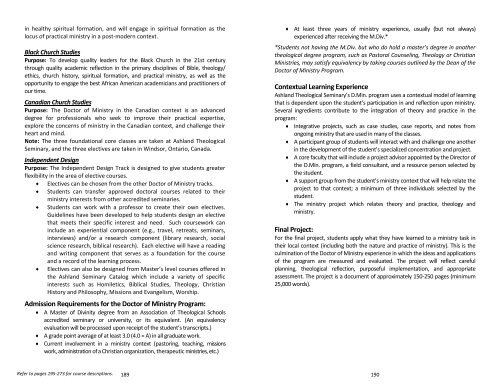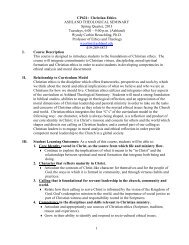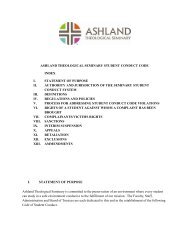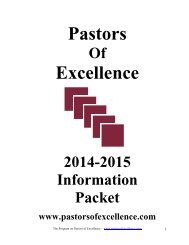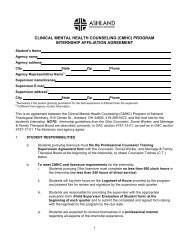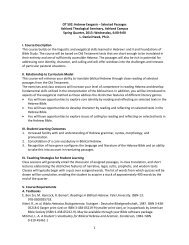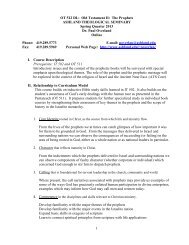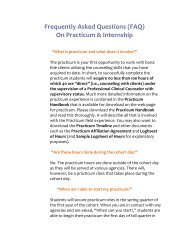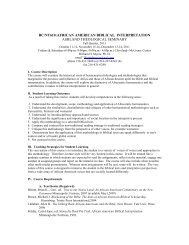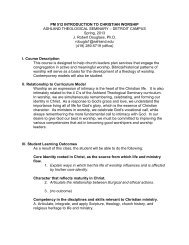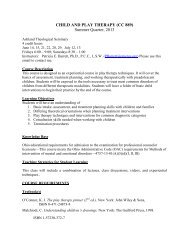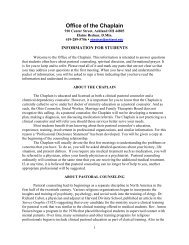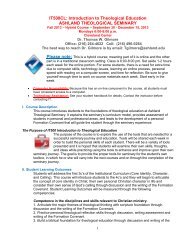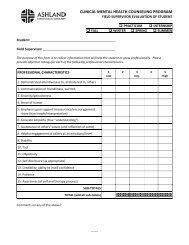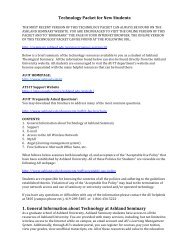Download - Ashland Theological Seminary - Ashland University
Download - Ashland Theological Seminary - Ashland University
Download - Ashland Theological Seminary - Ashland University
Create successful ePaper yourself
Turn your PDF publications into a flip-book with our unique Google optimized e-Paper software.
in healthy spiritual formation, and will engage in spiritual formation as the<br />
locus of practical ministry in a post-modern context.<br />
Black Church Studies<br />
Purpose: To develop quality leaders for the Black Church in the 21st century<br />
through quality academic reflection in the primary disciplines of Bible, theology/<br />
ethics, church history, spiritual formation, and practical ministry, as well as the<br />
opportunity to engage the best African American academicians and practitioners of<br />
our time.<br />
Canadian Church Studies<br />
Purpose: The Doctor of Ministry in the Canadian context is an advanced<br />
degree for professionals who seek to improve their practical expertise,<br />
explore the concerns of ministry in the Canadian context, and challenge their<br />
heart and mind.<br />
Note: The three foundational core classes are taken at <strong>Ashland</strong> <strong>Theological</strong><br />
<strong>Seminary</strong>, and the three electives are taken in Windsor, Ontario, Canada.<br />
Independent Design<br />
Purpose: The Independent Design Track is designed to give students greater<br />
flexibility in the area of elective courses.<br />
Electives can be chosen from the other Doctor of Ministry tracks.<br />
Students can transfer approved doctoral courses related to their<br />
ministry interests from other accredited seminaries.<br />
Students can work with a professor to create their own electives.<br />
Guidelines have been developed to help students design an elective<br />
that meets their specific interest and need. Such coursework can<br />
include an experiential component (e.g., travel, retreats, seminars,<br />
interviews) and/or a research component (library research, social<br />
science research, biblical research). Each elective will have a reading<br />
and writing component that serves as a foundation for the course<br />
and a record of the learning process.<br />
Electives can also be designed from Master’s level courses offered in<br />
the <strong>Ashland</strong> <strong>Seminary</strong> Catalog which include a variety of specific<br />
interests such as Homiletics, Biblical Studies, Theology, Christian<br />
History and Philosophy, Missions and Evangelism, Worship.<br />
Admission Requirements for the Doctor of Ministry Program:<br />
A Master of Divinity degree from an Association of <strong>Theological</strong> Schools<br />
accredited seminary or university, or its equivalent. (An equivalency<br />
evaluation will be processed upon receipt of the student’s transcripts.)<br />
A grade point average of at least 3.0 (4.0 = A) in all graduate work.<br />
Current involvement in a ministry context (pastoring, teaching, missions<br />
work, administration of a Christian organization, therapeutic ministries, etc.)<br />
At least three years of ministry experience, usually (but not always)<br />
experienced after receiving the M.Div.*<br />
*Students not having the M.Div. but who do hold a master’s degree in another<br />
theological degree program, such as Pastoral Counseling, Theology or Christian<br />
Ministries, may satisfy equivalency by taking courses outlined by the Dean of the<br />
Doctor of Ministry Program.<br />
Contextual Learning Experience<br />
<strong>Ashland</strong> <strong>Theological</strong> <strong>Seminary</strong>’s D.Min. program uses a contextual model of learning<br />
that is dependent upon the student’s participation in and reflection upon ministry.<br />
Several ingredients contribute to the integration of theory and practice in the<br />
program:<br />
Integrative projects, such as case studies, case reports, and notes from<br />
ongoing ministry that are used in many of the classes.<br />
A participant group of students will interact with and challenge one another<br />
in the development of the student’s specialized concentration and project.<br />
A core faculty that will include a project advisor appointed by the Director of<br />
the D.Min. program, a field consultant, and a resource person selected by<br />
the student.<br />
A support group from the student’s ministry context that will help relate the<br />
project to that context; a minimum of three individuals selected by the<br />
student.<br />
The ministry project which relates theory and practice, theology and<br />
ministry.<br />
Final Project:<br />
For the final project, students apply what they have learned to a ministry task in<br />
their local context (including both the nature and practice of ministry). This is the<br />
culmination of the Doctor of Ministry experience in which the ideas and applications<br />
of the program are measured and evaluated. The project will reflect careful<br />
planning, theological reflection, purposeful implementation, and appropriate<br />
assessment. The project is a document of approximately 150-250 pages (minimum<br />
25,000 words).<br />
Refer to pages 195-273 for course descriptions. 189<br />
190


